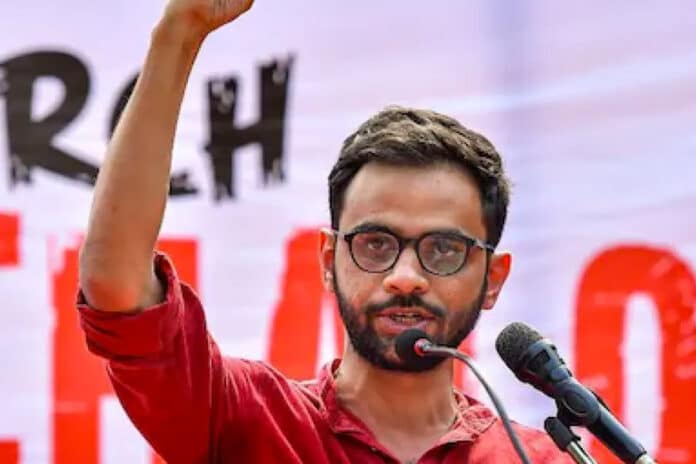Early Activism and Controversy
For many, Umar Khalid emerged as a prominent voice during his time at Jawaharlal Nehru University (JNU), advocating for social justice and rights issues. His activism took a significant turn when he organized protests against the hanging of a Kashmiri man in 2013, which sparked nationwide debate and contention. (In 2016, an intense controversy arose resulting in charges that would haunt him for years.)
Charges of Sedition and Initial Arrest
Umar was first charged with sedition alongside four colleagues following the protests at JNU, fundamentally changing the trajectory of his activist career. The allegations centered on claims that they incited anti-national sentiments, although many viewed these charges as politically motivated. (He was subsequently arrested in February 2016, marking the start of a tumultuous legal battle that continues today.)

Controversy swirled around Khalid as the sedition charges drew attention to the broader environment of dissent in India. The protests led to national scrutiny, debate on free speech, and the role of university activism in societal change.
You may find it noteworthy that while one case against him was dismissed, another remains unresolved as he navigates the complexities of the judicial system with charges now under the Unlawful Activities Prevention Act (UAPA). (His case exemplifies the challenges faced by many activists in today’s political climate.)
Arrest Under UAPA in September 2020
Clearly, Umar Khalid was arrested in September 2020 under the Unlawful Activities Prevention Act (UAPA), accused of being a key conspirator in the violent clashes in Delhi. (His arrest highlights the heavy legal repercussions for activists involved in protests against controversial laws.)
Allegations Related to Delhi Riots
Allegations against Khalid assert that he played a significant role in orchestrating the violence that erupted during the February 2020 riots in Delhi, which resulted in the deaths of 53 people, primarily Muslims.
Another aspect of these allegations includes Khalid’s connection to the protests against the Citizenship Amendment Act (CAA), which some view as discriminatory based on religion. You should note that Khalid and other activists have consistently denied these charges, claiming their involvement was limited to peaceful protests. Despite multiple attempts for bail, Khalid remains imprisoned as legal proceedings face delays, leaving him waiting for his day in court.
Denials of Bail and Extended Detention
Proceedings for Umar Khalid have been marked by repeated denials of bail, leaving him incarcerated for over four years without trial. Charged under the Unlawful Activities Prevention Act (UAPA), Khalid’s requests for bail have been rejected multiple times, complicating his right to a timely trial. The stringent nature of the UAPA significantly hampers defendants’ prospects of obtaining bail, leading to prolonged detention.
Delays and Future Hearings
Assuming you are following the proceedings, it’s important to note that multiple delays have hindered the progress of Khalid’s case. Various factors, such as the absence of lawyers and changes in the overseeing bench, have contributed to these setbacks. The next hearing is scheduled for January 24, where a decision on the trial’s commencement is expected (that day could bring hope for a resolution).
Current circumstances indicate that despite Khalid’s legal team’s confidence in demonstrating the lack of a solid case against him, the processing of his case remains slow. The anticipation surrounding upcoming hearings may lead to pivotal developments regarding his extended detention (ongoing legal battles continue to impact many similar cases).
Daily Routine and Activities
An imprisoned Umar Khalid fills his days with extensive reading and writing while also engaging with fellow inmates through a prison diary that has attracted publisher interest. He is allowed out of his cell during the day, but shares space with serious offenders, leading him to question his surroundings (Khalid’s next hearing is scheduled for January 24, marking a potential turning point in his long legal battle).
Family Visits and Personal Reflections
Now, family connections keep Umar Khalid’s spirits alive despite the constraints of prison life. His family is permitted a weekly 20-minute video call, while friends can visit for a 30-minute session. These brief interactions are moments of solace, where you can observe Khalid’s reflections on his circumstances and the impact of his activism.
Family visits provide Khalid with a sense of normalcy amidst the chaos of incarceration. During conversations, he often ponders the gravity of his situation, questioning why he is among those convicted of grave crimes. Such reflections reveal the emotional toll of his lengthy detention, highlighting the disconnect between his peaceful activism and the serious allegations against him.
Khalid’s Writing Projects
On a daily basis, Umar Khalid works diligently on a prison diary, documenting his life and experiences behind bars. This project has caught the attention of various publishers, highlighting his commitment to storytelling despite his circumstances. (His writing endeavors reflect a pursuit of truth amid adversity.)
Reading Habits and Book Donations
Khalid has become an avid reader during his time in prison, having read nearly 200 books. His partner regularly visits him with new literature, enhancing his literary collection and providing him with valuable insights into various topics. (This practice shows the importance of intellectual engagement during challenging times.)
Projects that support Khalid’s reading habits have led to an impressive exchange of ideas and perspectives. You may find it interesting that he shares his cell with convicted criminals, often using literature as a tool for reflection and understanding within that diverse environment. (Books are serving as a bridge for Khalid and a means for deeper personal connections.)
To wrap up
So, as you explore the case of Umar Khalid, it becomes clear that he is a former JNU student activist who has faced significant legal challenges, leading to his imprisonment for over four years. Charged under the UAPA, he has been accused of being a key conspirator in violent riots, yet maintains his stance of participating in peaceful protests. His ongoing detention without trial sheds light on broader concerns regarding civil liberties and the judicial process in India.


